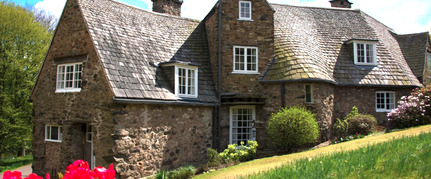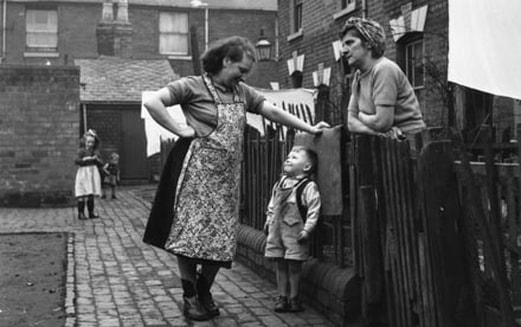DISCOVERING MORE ABOUT YOUR HOUSE
Your house - what information do you already know?

Have you ever wondered about the history of your house and the records you need to research? We tell you how here. You may already have lots of information about your house. Start by looking at the title deeds, which should (but not always) contain details of past transactions. If you don’t have them, they may be held by your mortgage provider or solicitor. The local library or history centre may have information about your house so it is worth asking whether any details have been lodged with them. Later as your research progresses the library or county archives will be the place to visit as they have many resources for your ongoing quest to discover your house history.
Can the Land Registry help?The Land Registry will provide you with details about your home, land ownership, mortgages, charges, easements, restrictive covenants, property boundaries, rights of way, past ownerships and house prices.
Follow this link for more details about the Land Registry and Title Deeds Examine the House |
|
|
Start by examining your house. You will find there are lots of clues to help you decide how old it is. The most obvious clues may lie in its former life. For instance is it a converted house which was once a chapel, pub, school, even toll gate or estate house? Of course there may also be an “erected date” somewhere on the building, or a previous house name carved into the stone work.
If however, like so many homes it has no obvious clue to a former history, take a good look at the architectural style and features on the outside and inside of the house. Pay particular attention to the form of construction of the original building. What materials were used and look at the roof and position of the windows? Look at neighbouring properties to see if there is any clue to tell you when the houses may have been built. Look out for changes that may have been made to the facades. Property developers over the years often rendered or "faced" the house. to give it a fresh look. So examine the side and back to see if there is can older house hidden by a new facade. Many features such as windows, doors and even roofs get changed or modified over the years but bricks (unless they are covered) remain. To find out more and for lots of helpful guidance we recommend you go to How to date your house on the How old is my House website. Read more about examining your house ........... |
SEARCHJust enter the key word below to search the whole website
|
Talk to Neighbours

Next talk to your neighbours to see if someone has already researched their house or the area. See if they know more about the history of the street or village.
Download our checklist and advice for talking to neighbours
If it is not your house, then dependent upon where it is, you may have to travel to find out more.
First you should try to see what is available on line. There are several sites that can help. Find My Past or Ancestry have lots of free records including the census, land and survey ready for you to look up without leaving your chair.
Most county councils, unitary authorities and some large town councils have a record office, or a local studies library. Before you travel, it’s a good idea to see what information your council has available online or by telephoning them.
Download our checklist and advice for talking to neighbours
If it is not your house, then dependent upon where it is, you may have to travel to find out more.
First you should try to see what is available on line. There are several sites that can help. Find My Past or Ancestry have lots of free records including the census, land and survey ready for you to look up without leaving your chair.
Most county councils, unitary authorities and some large town councils have a record office, or a local studies library. Before you travel, it’s a good idea to see what information your council has available online or by telephoning them.
|
There are a lot of records to help you discover more about your house.
Click on a guide below to find out more If the house is registered at the Land Registry you will find details of sales, boundary plans, owners, mortgages and other historical information To find out more about this and Title Deeds read here.... Maps
Old MAPS are a very important and a vital tool for tracing your house. When all else fails and the name or number is changed, or in some cases the address alters the position on a map will remain constant. Read more here..... Books & Histories
Local library and record offices will have a collection of local history books. These can be very helpful in providing background for your research and sometimes you may be lucky to find your home is actually mentioned or featured.Read more here....... Church records/
Glebe Terriers Church Records come in so many varied types. Some will help you discover more about your house and others are more appropriate for discovering more about the families who lived in it. Read more............ Wills & Inventories
The information found in Wills and Probate Inventories and Accounts can sometimes provide important information about houses and their fixtures and fittings and how people lived. Read more ................ Enclosures
The enclosure of common lands has been going on since the Medieval Period but the 1801 Enclosure Act set down a legal process. We set out how to find these here.......... taxation
There are many tax records that will assist you to find out more about property or the residents who lived in your house. Click here to read more..... Insurance Records
Insurance Records can excellent source of information - if you can find them - are insurance records. Many companies have records dating from 1680 forwards. The most well known and biggest is the Sun Fire Office.Read more........ manorial records
These records consist of ‘court rolls, surveys,maps, terriers, documents & books relating to the boundaries, franchises, wastes, customs or courts of a manor. Read more........... Council/ borough
Since the middle years of the 19th century, local councils took advantage of new powers available to them to require developers to submit plans for approval before building could take place. Read more ....... Other Records to Explore
|
|
The HouseLand Registry
Maps Manorial Records Other Records Postcards & Photos Enclosures Books & House histories Church & Parish Records |
The People |
|
OUR ADVERTISING POLICY - This website receives no funding or any other form of award and is run voluntarily to provide information to those who want to trace the history of their house. We would like to say thank you to all those who have or will in future click on the advertisements they find on this page. We know they can be a nuisance or distraction and we try to make sure that they are relevant to the information we provide and our readers. However the modest income we receive from them keep the web site going. So thank you.
